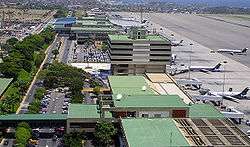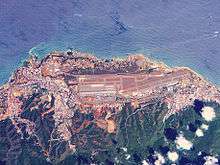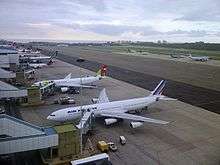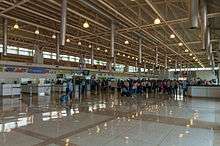Simón Bolívar International Airport (Venezuela)
Simón Bolívar International Airport or Maiquetía "Simón Bolívar" International Airport (IATA: CCS, ICAO: SVMI, Spanish: Aeropuerto Internacional de Maiquetia "Simón Bolívar")[1] is an international airport located in Maiquetía, Vargas, Venezuela about 21 kilometres (13 mi) west of downtown Caracas, the capital of the country. Simply called Maiquetía by the local population, it is the main international air passenger gateway to Venezuela. It handles flights to destinations in the Americas, Europe and the Middle East.
Maiquetía "Simón Bolívar" International Airport Aeropuerto Internacional de Maiquetía "Simón Bolívar" | |||||||||||||||
|---|---|---|---|---|---|---|---|---|---|---|---|---|---|---|---|
 | |||||||||||||||
| Summary | |||||||||||||||
| Airport type | Public | ||||||||||||||
| Owner/Operator | Instituto Autónomo del Aeropuerto Internacional de Maiquetía | ||||||||||||||
| Serves | Caracas, Venezuela | ||||||||||||||
| Location | Maiquetía | ||||||||||||||
| Hub for |
| ||||||||||||||
| Elevation AMSL | 235 ft / 72 m | ||||||||||||||
| Coordinates | 10°36′11″N 066°59′26″W | ||||||||||||||
| Website | aeropuerto-maiquetia.com.ve | ||||||||||||||
| Map | |||||||||||||||
.jpg) SVMI Location of airport in Venezuela | |||||||||||||||
| Runways | |||||||||||||||
| |||||||||||||||
| Statistics (2015) | |||||||||||||||
| |||||||||||||||
History
The airport opened in 1945 as the Aeropuerto Internacional de Maiquetía.[2] The site had been recommended as an appropriate location for an airport by Charles Lindbergh on behalf of Pan Am.[3] The USA subsidised the construction of the airport as part of the Airport Development Program. Luis Malaussena was the architect who designed the original passenger terminal.[4]
It was regularly visited by the Anglo-French supersonic airliner Concorde until the 1980s. Commencing in the late 1970s, Air France operated weekly Concorde service between Caracas and Paris via a stop at Santa Maria Airport (Azores) located in the Atlantic Ocean.[5]
Between 1952 and 1962, two new wings were added to the passenger terminal, and the runway was expanded to 2,000 metres (6,600 ft). Lighting was installed on the runway and approach zones to allow night operations. In 1956 a new runway was built, and in 1962, it was expanded to 3,000 metres (9,800 ft) long by 60 metres (200 ft) wide.
In the 1970s a new international terminal was constructed to offer increased capacity with a domestic terminal opening in 1983. Since 2000, the airport has been undergoing major changes in order to meet international standards and to improve passenger traffic, security, immigration areas, and customs areas. Security measures have become top priority since the September 11, 2001 attacks, and now departure areas and arrival areas are completely split into the lower and upper levels of the airport. The Proyecto Maiquetía 2000 (Project Maiquetia 2000) was completed in 2007 which added new customs and immigration areas, a new cargo terminal, and a connecting passageway between the domestic and international terminal.
As part of an expansion plan, new international gates are currently in construction, and a section of the parking area has been cleared to build an airport hotel. In the 1950s under the regime of Marcos Pérez Jiménez, road transport between the airport and the capital was improved by the inauguration of the Caracas-La Guaira highway. However, the La Guaira and Caracas Railway, dating from the nineteenth century, was closed. In May 2007 a maglev train was proposed to link Caracas to La Guaira and Simón Bolívar International Airport. In light of the crisis in Venezuela since 2010, the maglev train is not expected to be operational soon. In 2016 the old jetways in the international terminal were replaced with new glass-walled jetways.
Crisis in Venezuela
During the ongoing crisis in Bolivarian Venezuela, domestic airlines are laboring under tremendous difficulties because of hyperinflation and parts shortages. Many international airlines have left the country.[6] International airlines that have left Venezuela include Aeroméxico, Aerolíneas Argentinas, Air Canada, Alitalia, Avianca, Delta, Lufthansa, and LATAM, making travel to the country difficult. According to the International Air Transport Association (IATA), the Bolivarian government has not paid US$3.8 billion to international airlines in a currency issue involving conversion of local currency to U.S. dollars.[7] Airlines have left for other reasons, including crime against flight crews, stolen baggage, and problems with the quality of jet fuel and maintenance of runways.[8]
Following the increasing economic partnership between Venezuela and Turkey in October 2016, Turkish Airlines started offering direct flights from December 2016 connecting between Caracas to Istanbul (via Havana, Cuba) in an effort to "link and expand contacts" between the two countries.[9]
By 2018, terminals in the airport lacked air conditioning and utilities such as water and electricity. Flight crews are often sent to different cities to avoid crime that occurs in the area. The company charged with providing sanitation services ceased to exist, so cleaning no longer occurs as frequently at the facility. The Bolivarian National Guard, tasked with providing security, often extorts travelers by force.[10]
In support of President Nicolas Maduro's government, Russian Air Force aircraft, including Tupolev Tu-160 bombers, were deployed to the airport in early December 2018.[11] In March 2019, two Russian planes were deployed to the airport carrying 100 troops and 35 tonnes of matériel.[12] The Russian planes left the country 3 months later on 26 June 2019, according to the Russian embassy announcement.[13]
American Airlines, the last U.S. airline serving Venezuela, left on 15 March 2019, after its pilots refused to fly to Venezuela, citing safety issues.[14] Two months later, the United States Department of Transportation and Department of Homeland Security indefinitely suspended all flights between Venezuela and the United States, due to safety and security concerns.[15] The suspension affects mainly Venezuelan airlines that flew to Miami: Avior Airlines, LASER Airlines, and Estelar Latinoamerica.
Iranian airline Mahan Air (blacklisted by the U.S. government since 2011[16]) began direct flights to Caracas in April 2019,[17] "signifying a growing relationship between the two nations" according to Fox News.[16]
Following the COVID-19 pandemic, the government announced on 3 February 2020 that the country has imposed epidemiological surveillance, restrictions and diagnostic system to detect possible patients at this airport and that Venezuela will receive a diagnostic kit for the virus strain from the Pan American Health Organization (PAHO).[18]
Airlines and destinations
Passenger
- ^1 Turkish Airlines' flight from Caracas to Istanbul makes a stop in Havana. However, the airline does not have traffic rights to transport passengers solely between Caracas and Havana.
Chronology of international airlines formerly serving Caracas



Since 2014, foreign and domestic carriers have reduced their presence due to political instability and their inability to recover US$3.8 billion[19] in funds owed to airlines. For fear of safety, some carriers have avoided overnight flight crews in Caracas, choosing to make a stop in a nearby country instead.[10][20] The chronology of terminations is as follows:[21]
| Airline | Destination | Flight frequency | Terminated/Suspended |
|---|---|---|---|
| Air Canada | 4 flights per week | 18 March 2014 | |
| Avianca Costa Rica | Daily flights | 7 April 2014 | |
| American Airlines | 1 flight per week | 1 July 2014 | |
| American Airlines | Daily flights | 1 July 2014 | |
| Alitalia | 1 flight per week | 3 April 2015 | |
| Gol Transportes Aéreos | 1 flight per week | 10 February 2016 | |
| American Airlines | 5 flights per week | 4 April 2016 | |
| LATAM Brasil | 1 flight per week | 28 May 2016 | |
| Lufthansa | 3 flights per week | 17 June 2016 | |
| Aeroméxico | 3 flights per week | 23 June 2016 | |
| LATAM Perú | 1 flight per week | 1 August 2016 | |
| LATAM Chile | 2 flights per week | 1 August 2016 | |
| LATAM Chile | 1 flight per week | 1 August 2016 | |
| Dynamic Airways | Daily flights | 13 August 2016 | |
| Insel Air | Daily flights | 7 June 2017 | |
| United Airlines | Daily flights | 30 June 2017 | |
| Avianca | 3 flights per day | 27 July 2017 | |
| Dynamic Airways | 2 flights per week | 1 August 2017 | |
| Aerolíneas Argentinas | 1 flight per week | 5 August 2017 | |
| Delta Air Lines | Daily flights | 16 September 2017 | |
| TAME | 4 flights per week | 3 February 2018 | |
| American Airlines | 2 flights per day | 15 March 2019 | |
| Cubana de Aviación | Weekly flights | 23 October 2019[22] |
Cargo
| Airlines | Destinations |
|---|---|
| DHL Aviation | Port of Spain |
| KF Cargo | Lima |
| Sky Lease Cargo | Lima |
| Solar Cargo | Barbados, Bogota, Curaçao, Guatemala City, Lima, Panama City, Punta Cana |
| Transcarga | Barbados, Curaçao |
| Vensecar International | Aruba, Bogota, Curaçao, Panama City |
Statistics
| Movements | 2016 | 2013 | 2012 | 2011 | 2010 | 2009 | 2008 | 2007 | 2006 | 2005 | 2004 |
|---|---|---|---|---|---|---|---|---|---|---|---|
| International | ≈650,000 | 2,253,471 | 2,699,244 | 3,222,000 | 3,415,214 | 3,552,781 | 3,909,470 | 4,081,752 | 3,668,783 | 3,251,037 | 3,224,981 |
| Total | - | 5,822,225 | 6,956,178 | 6,430,000 | 7,511,843 | 7,830,688 | 8,073,461 | 7,722,268 | 7,373,053 | 7,032,719 | 6,772,583 |
| Source: WTO (2016),[10] IAIM | |||||||||||
Other facilities
From 1960 to 1997, it was the main hub for Viasa, Venezuela's former flag carrier until it went bankrupt. As well as it was the hub for Avensa, Servivensa. Conviasa started operation in 2004, hoping to become in a big and leader airline, and flag carrier. However, due to financial crisis in Venezuela, several pilots quit and are leaving Conviasa in order to fly to other nations like Turkey which operates the same type of aircraft.[23][24] The headquarters of Conviasa is located on the airport grounds.[25]
Accidents and incidents
- On 27 November 1956, Linea Aeropostal Flight 253, a Lockheed Constellation, crashed while on final approach to Caracas Airport. All 25 passengers and crew on board were killed.[26]
- On 12 December 1968, Pan Am Flight 217, crashed while on approach to Caracas. All 51 passengers and crew on board were killed.
- On 3 December 1969, Air France Flight 212 crashed shortly after takeoff from Simón Bolívar International Airport. All 62 passengers and crew on board were killed.[27]
- On 3 November 1980, a Latin Carga Convair CV-880 crashed on take-off from the airport, resulting in the deaths of 4 occupants, and total destruction of the aircraft. The aircraft involved, registration YV-145C, had flown from 1962 to January 1974 for Delta Air Lines of the United States and was retired by that airline, then sold to Latin Carga in 1979.[28]
- On 16 October 2008, a RUTACA Airlines Boeing 737 went out of the runway while braking for arrival at 3:30 PM. It was flying from San Antonio de Tachira with 44 people. No one was killed or injured.
In popular culture
The airport is shown on the movie Menudo: La Película, when a pair of Menudo's friends board a flight during the film's final scenes. The airport is also shown in the 1975 French film "Le Sauvage" [Call me Savage, UK Title] starring Catherine Deneuve, Yves Montand Luigi Vannucchi and Tony Roberts, directed by Jean-Paul Rappeneau, as several soap-opera and movie key scenes were filmed at the airport.
See also
- Los Roques Airport – an airport serving Los Roques archipelago national park, remotely controlled from Simón Bolívar International Airport
- List of airports in Venezuela
- List of airlines of Venezuela
References
- "Aeropuerto Internacional de Maiquetía "Simón Bolívar" (official website)" (in Spanish). Retrieved 5 June 2013.
- Vías hacia la modernización 1935/1958. Historia de Venezuela en Imágenes. 1999
- "Wayback Machine" (PDF). 30 December 2008. Archived from the original (PDF) on 30 December 2008. Retrieved 25 March 2019.
- "Web Page Under Construction". www.eud.com.
- http://www.timetableimages.com, Summer 1977 Air France system timetable
- Buitrago, Deisy and Fabián Andrés Cambero (6 July 2018). "Venezuela's domestic airline industry suffers amid economic crisis". Reuters. Retrieved 8 April 2019.
- Mandel, Eric (1 August 2017). "Delta pulling last direct flight from Atlanta to Venezuela". Atlanta Business Chronicle. Retrieved 24 May 2019.
- Tanzi, Christine Jenkins (9 August 2017). "Why airlines hate flying to Venezuela". Bloomberg. Retrieved 8 April 2019.
- "Turkish Airlines starts direct Istanbul-Havana-Caracas flights". EFE. 20 December 2016. Retrieved 25 May 2019.
- "Venezuela Is Collapsing. So Is Its Biggest Airport". CityLab. 12 June 2018. Retrieved 15 June 2018.
- Isachenkov, Vladimir; Burns, Robert (10 December 2018). "Russia sends 2 nuclear-capable bombers to Venezuela". Sightline Media Group.
Russia’s Defense Ministry said a pair Tu-160 bombers landed at Maiquetia airport outside Caracas on Monday following a 10,000-kilometer (6,200-mile) flight. [...] It added that a heavy-lift An-124 Ruslan cargo plane and an Il-62 passenger plane accompanied the bombers to Maiquetia.
- "Russian air force planes land in Venezuela carrying troops: report". Reuters. 24 March 2019. Retrieved 24 March 2019.
- "Russia to withdraw military 'technicians' from Venezuela on Wednesday: embassy". AFP. 26 June 2019. Retrieved 19 July 2019.
- "American Airlines suspends flights to Venezuela over safety concerns". NBC News. Associated Press. 15 March 2019. Retrieved 8 April 2019.
- "US suspends all flights to Venezuela citing safety and security". ABC News. 15 May 2019. Retrieved 18 May 2019.
- Suarez Sang, Lucia I (8 April 2019). "US-blacklisted Iranian airline begins direct flights to Venezuela". FOX News. Retrieved 8 April 2019.
- "Mahan Air inaugura vuelo directo entre Irán y Venezuela" [Mahan Air inaugurates direct flight between Iran and Venezuela]. NTN 24 (in Spanish). 8 April 2019. Retrieved 8 April 2019.
- "Venezuela imposes entry restrictions over coronavirus". Prensa Latina (English). 3 February 2019. Retrieved 4 February 2019.
- https://www.bizjournals.com/atlanta/news/2017/08/01/last-direct-flight-from-atlanta-to-venezuela-being.html
- "Iberia changes its non-stop Caracas route with a stop in Santo Domingo, citing safety concerns - Airways Magazine". Airways Magazine. 3 August 2017.
- "Aerolíneas Argentinas Temporarily Suspend Flights to Caracas, Venezuela - Airways Magazine". Live and Let's Fly - Boarding Area. 2 August 2017.
- Cubana cancela vuelos al Caribe por restricciones de EEUU a terceros, Aero Latin News, 24 October 2019, retrieved 2019-10-24
- "Pilotos de Conviasa renuncian por bajos sueldos". www.entornointeligente.com.
- Sumarium, Grupo. "Renunciaron en Conviasa 15 pilotos por bajos sueldos - Sumarium". Archived from the original on 14 August 2016. Retrieved 12 August 2016.
- "Sede Principal" (in Spanish). Conviasa.
- Harro Ranter (27 November 1956). "ASN Aircraft accident Lockheed L-749-79 Constellation YV-C-AMA Caracas Airport (CCS)". Retrieved 3 June 2015.
- "ASN Aircraft accident Boeing 707-328B F-BHSZ Caracas-Simon Bolivar Airport".
- Harro Ranter (3 November 1980). "ASN Aircraft accident Convair CV-880-22-2 YV-145C Caracas-Simon Bolivar Airport (CCS)". Retrieved 3 June 2015.
External links
![]()
- Aeropuerto Internacional de Maiquetía "Simón Bolívar" (official website)
- Airport information for SVMI at World Aero Data. Data current as of October 2006.
- Accident history for CCS at Aviation Safety Network